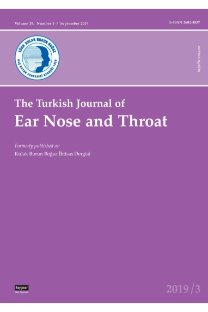İdyopatik spontan beyin omurilik sıvısı rinorenin endoskopik tedavisi: Olgu sunumu
Beta-2-transferrin, beyin omurilik sıvısı rinore, spontan, sisternografi, bilgisayarlı tomografi, endoskopik tedavi
Endoscopic treatment of idiopathic spontaneous although cerebrospinal fluid rhinorrhea: a case report
Beta-2-transferrin, cerebrospinal fluid rhinorrhea, spontaneous, cisternography, computed tomography, endoscopic surgical procedure,
___
- Applebaum EL, Chow JM. Cerebrospinal fluid leaks. In: Cummings CW, Fredrickson JM, Harker LA, Krause CJ, Richardson MA, Schuller DE, editors. Otolaryngology Head and Neck Surgery. 3rd ed. St. Louis: Mosby; 1998. p. 1189-98.
- Dunn CJ, Alaani A, Johnson AP. Study on spontane- ous cerebrospinal fluid rhinorrhoea: its aetiology and management. J Laryngol Otol 2005;119:12-5.
- Hegazy HM, Carrau RL, Snyderman CH, Kassam A, Zweig J. Transnasal endoscopic repair of cerebrospinal fluid rhinorrhea: a meta-analysis. Laryngoscope 2000; 110:1166-72.
- Wise SK, Schlosser RJ. Evaluation of spontaneous nasal cerebrospinal fluid leaks. Curr Opin Otolaryngol Head Neck Surg 2007;15:28-34.
- Martin TJ, Loehrl TA. Endoscopic CSF leak repair. Curr Opin Otolaryngol Head Neck Surg 2007;15:35-9.
- Lee TJ, Huang CC, Chuang CC, Huang SF. Transnasal endoscopic repair of cerebrospinal fluid rhinorrhea and skull base defect: ten-year experience. Laryngoscope 2004;114:1475-81.
- McMains KC, Gross CW, Kountakis SE. Endoscopic management of cerebrospinal fluid rhinorrhea. Laryngoscope 2004;114:1833-7.
- Schlosser RJ, Bolger WE. Significance of empty sella in cerebrospinal fluid leaks. Otolaryngol Head Neck Surg 2003;128:32-8.
- Casiano RR, Jassir D. Endoscopic cerebrospinal fluid rhinorrhea repair: is a lumbar drain necessary? Otolaryngol Head Neck Surg 1999;121:745-50.
- Mirza S, Thaper A, McClelland L, Jones NS. Sinonasal cerebrospinal fluid leaks: management of 97 patients over 10 years. Laryngoscope 2005;115:1774-7.
- Schmerber S, Righini C, Lavielle JP, Passagia JG, Reyt E. Endonasal endoscopic closure of cerebrospinal fluid rhinorrhea. Skull Base 2001;11:47-58.
- Ohtakara K, Matsubara T, Kojima T, Taki W, Waga S. Cerebrospinal fluid rhinorrhea associated with untreated prolactinoma-case report. Neurol Med Chir (Tokyo) 2000;40:413-8.
- Zweig JL, Carrau RL, Celin SE, Schaitkin BM, Pollice PA, Snyderman CH, et al. Endoscopic repair of cere- brospinal fluid leaks to the sinonasal tract: predictors of success. Otolaryngol Head Neck Surg 2000;123:195- 201.
- Wigand ME. Transnasal ethmoidectomy under endo- scopic control. Rhinology 1881;19:7-5.
- ISSN: 2602-4837
- Yayın Aralığı: 4
- Başlangıç: 1991
- Yayıncı: İstanbul Üniversitesi
İdyopatik spontan beyin omurilik sıvısı rinorenin endoskopik tedavisi: Olgu sunumu
Leyla KANSU, Babür AKKUZU, Suat AVCI
Uğur DOKUZLAR, Levent ERİŞEN, Fikret KASAPOĞLU, Hamdi Hakan COŞKUN, Oğuz BASUT, Selçuk ONART, İbrahim HIZALAN
Nazal septumdan kaynaklanan ekstranazofarengeal anjiyofibrom: Olgu sunumu
Melek UYAR, Mehmet TURANLI, Işın PAK, Sibel BAKIR, Üstün OSMA
Tonsillektomi sonrası ağrının tedavisi: Prospektif, randomize klinik çalışma
Nusret İNCİ, Oğuz BASUT, Fikret KASAPOĞLU, Hamdi Hakan COŞKUN
Karotis arter invazyonu gösteren dev servikal lipoma: Olgu sunumu
Alper Tunga DERİN, Kenan GÜNEY, Murat TURHAN, Abdullah ERDOĞAN, Bülent V. AĞIRDIR
